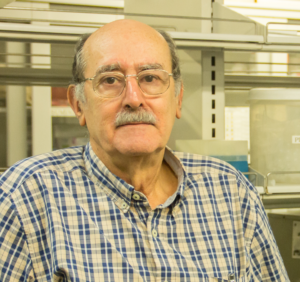 Our April Immunologist of the month is Luis Fernando García an Emeritus Professor at the Universidad de Antioquia (UdeA) in Medellín, Colombia. He is Medical Doctor and has a Master of Sciences degreed from the Udea. Luis Fernando took up a post-doctoral fellowship in the Bowman Gray School of Medicine at Wake Forest University in North Carolina, USA. He founded the Research group of Inmunología Celular e Inmunogenética (GICIC) in UdeA. Additionally, Dr. García was president of the Asociación Latinoamericana de Inmunología (ALAI) between 2012 and 2015 and he organized the 11th Congress of the ALAI and the 10th Colombian Congress of Allergy, Asthma, and Immunology – ACAAI (ImmunoColombia2015). Dr. García has experience in understanding immune responses to Tuberculosis infection and transplantation immunology.
Our April Immunologist of the month is Luis Fernando García an Emeritus Professor at the Universidad de Antioquia (UdeA) in Medellín, Colombia. He is Medical Doctor and has a Master of Sciences degreed from the Udea. Luis Fernando took up a post-doctoral fellowship in the Bowman Gray School of Medicine at Wake Forest University in North Carolina, USA. He founded the Research group of Inmunología Celular e Inmunogenética (GICIC) in UdeA. Additionally, Dr. García was president of the Asociación Latinoamericana de Inmunología (ALAI) between 2012 and 2015 and he organized the 11th Congress of the ALAI and the 10th Colombian Congress of Allergy, Asthma, and Immunology – ACAAI (ImmunoColombia2015). Dr. García has experience in understanding immune responses to Tuberculosis infection and transplantation immunology.
Name: Luis Fernando García Moreno
Position: Emeritus Professor, Grupo de Inmunología Celular e Inmunogenética, Sede de Investigación Universitaria, Facultad de Medicina, Universidad de Antioquia, Medellín, Colombia
What is your research interest? My main research interests have been the “Immune response in tuberculosis” and “Transplantation Immunology”
How has your research contributed to better understanding your research area? In the study of the immune response to Tuberculosis (TB), our group was one of the first to study the mechanisms and significance of the death of Mycobacterium tuberculosis -infected macrophages. We were the first to show that mononuclear phagoctytes from patients with active TB undergo necrosis, upon exposure to mycobacteria or PPD, whereas in individuals with latent TB these cells preferentially exhibit apoptosis. More recently we have provide epidemiological evidence that apoptosis may indeed correlate with resistance to develop TB in exposed household contacts. We also have study the paradoxical production of IFN-γ in TB showing that in active TB there is a decreased production ofIFN-γ compared to latent TB, and that household contacts recently exposed to a TB index case that are higherIFN-γ producers, which are at a highest risk of developing active TB. These paradoxical responses may be explained by the increase frequency of Tregs and decreased frequency of central memory T cells in patients with active TB.
In Transplantation Immunology our laboratory has been the leader in Colombia in tissue typing for different clinical transplants (kidney, heart, lung, pancreas, hematopoietic cells) and is the only laboratory in the country with international accreditation. Also we had study different aspects of the immune response and tolerance in kidney transplantation. One of the most interesting topics are the mechanisms of operational tolerance occurring in patients that for different reason did not continue receiving immunosuppressive therapy. The main findings show that patients with operational tolerant have altered T cell repertoire and increase Treg activity. These studies have been done in collaboration with investigators of the University of Heidelberg in Germany.
Why do you work in immunology? I became interested in immunology in my first year of medical school. Since then I have been fascinated by the role of the immune system in the evolution of the living beings, the complexity of the immune system and the implication of its alterations in the human health. Also, the history of how the knowledge on the immune response has been generated is a fascinating topic for me.
What were your biggest difficulties in your research? To do research in a country like Colombia is not easy. The lack of scientific culture in our society translates into a lack of clear and permanent politics in science and technology and, of course, in poor financial support. However, I have to say that during my active research career I was always supported by Colciencias and my institution, the Universidad de Antioquia. One point particulary important relates with the difficulties in the access to reagents and materials needed for research. The burocracy and the amount of paperwork required to import these goods is almost unbearable.
What is the best advice or recommendations for young scientist in Colombia? To work hard, with your brains and your hands, to become international competitive scientists. Do not forget, as Burnet said, “that the little problem you are addressing in your research is part of a more general scientific problem that you must be acquainted with“. For the young immunologists, my advice is to get in love with the beauty of the immune system and work hard to seduce it, so you can have access to its best secrets.
What other immunological activities are you involved in? Between 2012 and 2015, I was president of the Asociación Latinoamericana de Inmunología (ALAI) and organized its 10th Congress, ImmunoColombia2015 in Medellín. At the moment, I am member of the IUIS Council and the EDU Committee. In my University, I direct a seminar for faculty members and doctoral students named “Rediscovering the Immune system”.
What do you consider to be the greatest gift you could leave to immunology in Colombia? The large number and the high quality of young people that I formed as immunologists, that are now leaders of many immunology groups in Colombia and abroad.
Interview by Immunopaedia Ambassador Jose Mateus Triviño










